Beaucerons are large dogs, most weighing between 57 and 88 pounds and standing between 24 to 28 inches tall. Females tend to be smaller than males, typically standing between 24 and 26.5 inches, while males generally stand between 25.5 and 27.5 inches tall.
Beauceron
Breed Type: Herding
Common nicknames: Beauce Sheepdog, Bas Rouge
Coat: Smooth, double
Hypoallergenic: No, they will likely trigger allergies.
Temperament: Intelligent, loyal, energetic, independent
Life expectancy: 10-12 years
Color & patterns: Black and tan

The Beauceron, a magnificent and charismatic breed, is a true powerhouse ready to conquer the world by your side. This breed typically stands at around 24 to 27.5 inches tall and has a sleek, double-layered coat that requires minimal maintenance. They have muscular physiques that contribute to their impressive strength and agility, and are ideal partners for outdoor adventures and activities. Beaucerons are also exceptionally intelligent, which makes them quick learners — they’re highly trainable in various tasks such as obedience, herding, and even search and rescue work. Beaucerons are also renowned for their loyalty and protective nature, making them excellent guardians of their families. Whether you’re up for a game of fetch or a long hike in the great outdoors, the Beaucerons will be by your side, ready for any adventure.
Beauceron characteristics
Learn about about Beauceron basics like their fur colors, shedding levels, how much grooming they need, and other Beauceron facts.
Average height
24-28 inches (61.0-71.1cm)
Average weight
57-88 pounds (25.9-39.9 kg)
Average lifespan
10-12 years
Exercise needs
Grooming needs
Full-grown size
Good with cats
Good with kids
Training aptitude
How long do Beaucerons live?
Beaucerons live 10 to 12 years. As with any breed, factors such as genetics, diet, exercise, healthcare, and overall care can influence an individual Beauceron’s lifespan. Providing proper veterinary care, regular exercise, a balanced diet, and a loving environment can contribute to their health and longevity.
When do Beaucerons stop growing?
Beaucerons reach their full height between 12 and 18 months of age. They typically continue to fill out and develop muscle until they are about two to three years old, by which point most Beaucerons will have reached their adult size and weight.
How much do Beaucerons shed?
Beaucerons are moderate shedders. Regularly brushing their coats will keep shedding at bay and maintain a healthy-looking coat.
What color are Beaucerons?
The Beauceron can come in colors including harlequin, black and tan, gray black and tan, and black and rust.
Beauceron temperament
Learn about about the Beauceron temperament and how well they fit into your lifestyle, home environment, and family.
Are Beaucerons good family dogs?
Yes, Beaucerons are great family dogs. Loyal and devoted, Beaucerons form strong bonds with their families, including children, and are committed to protecting them. That said, as with any breed, it is recommended that your child is always supervised when interacting with your dog to keep both the child and dog safe. Teaching children how to properly approach and handle dogs is crucial to ensure positive experiences for both the dog and the child, as is teaching dogs how to interact gently with children.
Beaucerons are also affectionate and devoted companions who thrive when included in family activities, especially active outdoor adventures. This dog loves a job, so physical and mental stimulation is key for this breed’s well-being. Overall, Beaucerons can be excellent family dogs for households that can provide them with the attention, training, and activity they need to thrive.
Are Beaucerons good with kids?
Yes, Beaucerons are good with children due to their playful, protective, and gentle natures. Bear in mind, though, that they are large dogs, and they can accidentally knock over small children during play.
As with any breed, supervise children and dogs to keep both safe and happy. Proper training, socialization, and supervision will help ensure a harmonious and loving relationship between Beaucerons and kids, as will teaching children how to properly approach and handle dogs.
Are Beaucerons good with cats?
It depends. Beaucerons have a strong prey drive, which means they are likely to give chase to a cat. But Beaucerons can get along well with cats they are raised alongside and who have been socialized together since they were small.
Are Beaucerons good with other dogs?
Yes, Beaucerons are good with other dogs, provided they’ve been socialized early and received consistent training. As a breed known for their strong herding instincts and protective nature, Beaucerons may exhibit assertive or dominant behavior, especially towards unfamiliar dogs or those they perceive as threatening to their territory or family. Supervision and training can play key roles in ensuring Beaucerons get along well with the other pups they meet on the sidewalk and in the park.
Do Beaucerons bark a lot?
No, Beaucerons don’t bark a lot. They will bark to alert their families to perceived threats or unfamiliar situations, but not indiscriminately or without reason.
Are Beaucerons smart dogs?
Yes, Beaucerons are very smart. As a breed historically bred for herding and guarding responsibilities, they possess keen problem-solving abilities, are quick to learn new skills, and have a strong desire to work closely with their pet parents. Their intelligence is evident in their ability to excel in various sports and activities, including obedience, agility, and tracking. Their intelligence, combined with their loyalty and strong work ethic, makes them highly capable and trainable companions for those willing to engage them mentally and physically.
Are Beaucerons good for first-time pet parents?
Beaucerons aren’t the best fit for first-time pet parents given their strong-willed nature, high energy levels, and need for consistent training and socialization. They require experienced handling to manage their smarts, strength, and potential assertiveness. That said, a motivated first-time pet parent will find an intelligent and loyal companion in a Beauceron if they are willing to put effort into firm, consistent training.
Do Beaucerons like to swim?
No, Beaucerons do not like to swim. Given the choice, a Beauceron would rather bound around the park than jump in the water, as they’re not a breed that naturally gravitates towards swimming (they were bred to do their work on dry land, after all). However, with patient introduction and positive reinforcement, some Beaucerons can learn to enjoy swimming as a form of exercise and fun bonding time with their families.
Are Beaucerons easy to train?
Yes, Beaucerons are easy to train, given their intelligence, loyalty, and desire to work closely with their pet parents. Beaucerons are also known for their independent nature and can sometimes be strong-willed. Firm, consistent training with lots of positive reinforcement will pay off in this smart, eager-to-please breed.
Beauceron health
Learn about about the Beauceron health outlook and what diseases they may be prone to at various stages of their life.
Are Beauceron ears cropped?
In the past, it was common for a Beauceron’s ears to be cropped. Today, ear cropping is a controversial practice and has been banned or restricted in many countries due to animal welfare concerns. There is no medical reason to crop a dog’s ears, and vets do not recommend it.
Are Beaucerons healthy?
The Beauceron is overall quite healthy, without any significant genetic disorders specific to the breed. Diseases Beaucerons are prone to:
Hip and/or elbow dysplasia: Hip and elbow dysplasia are two of the most common skeletal diseases seen in dogs. They are similar diseases in which either the hip or elbow joint has grown abnormally or is misshapen. The abnormal shape prevents the joints and sockets from adequately meeting one another, resulting in rubbing and grinding instead of sliding smoothly. Though the main complication with hip dysplasia is joint instability, the abnormalities present in elbow dysplasia often result in pieces of bone and/or cartilage breaking loose and irritating the joint tissues. Over time, the rubbing from dysplasia can cause a variety of issues, such as pain, lameness, and secondary osteoarthritis. Surgery can be done to fix the joint if diagnosed before the onset of arthritis. If you are rescuing a Beauceron, have them checked out by a vet to see if they have or are prone to getting dysplasia so you know what they will be able to handle regarding activities and exercise.
Osteochondrosis dissecans (OCD): This condition causes improper growth of the cartilage in the joints. It’s usually observed in the elbows but has also been seen in the shoulders. The lack of cartilage properly covering the bone creates stiffness in the joint to the point that a dog becomes unable to bend her elbow. High-protein foods designed to increase growth (such as puppy formulas) may contribute to the development of Osteochondrosis dissecans.
Dilated cardiomyopathy: Dilated Cardiomyopathy is a heart condition that is characterized by the heart muscles’ inability to contract properly, which ultimately leads to a decrease in blood pumping to the heart. When a dog has cardiomyopathy both the heart chambers become enlarged from having to work harder to get blood through. The extra stress on the heart from the restricted blood flow often leads to congestive heart failure (CHF). The major symptoms of DCM include lethargy, anorexia, rapid breathing, shortness of breath, coughing, a swollen abdomen, and temporary loss of consciousness.
Others: Gastric dilatation-volvulus, a sudden, painful, and life-threatening swelling and twisting of the abdomen; progressive retinal atrophy (PRA), a progressive degenerative disease affecting the retina that eventually leads to blindness; and allergies. To identify some of these issues, a veterinarian may recommend hip, eye, and imaging tests for the dog.
Are Beauceron hypoallergenic?
No, Beaucerons are not hypoallergenic. They have a double-layered short- to medium-length coat with a dense undercoat and a coarser outer coat. While they do shed, it’s easily managed with regular grooming at home.
Beauceron history
Learn about where this Beauceron came from!
What are Beaucerons bred for?
Beaucerons were primarily bred for herding livestock, guarding property, and working with police and military in search and rescue roles, as well as detection and patrol.
Where are Beaucerons from?
The Beauceron is from France and is named after the region of Beauce, located southwest of Paris. Also known as the Berger de Beauce or the French Shorthaired Shepherd, the breed standard for the Beauceron was written in 1897. They have a long-standing history as capable and loyal working dogs in their native country.
Is a Beauceron related to a Rottweiler?
No, a Beauceron is not related to a Rottweiler. While both are large and robust dog breeds, they do not share a genetic lineage and have distinct histories, appearances, and temperaments. Rottweilers, for example, are an older breed from Germany, historically used as cattle driving and guarding dogs. Beaucerons, on the other hand, are herding dogs known for their agility, intelligence, and loyalty.
How to pronounce Beauceron?
The correct pronunciation of “Beauceron” is “boh−suh−rawn.”
Popular Beauceron mixes
The breed most commonly mixed with Beaucerons is the Poodle. However, the characteristics of these mixes can vary widely depending on factors such as the individual dog’s genetics and upbringing.
Beauceroodle (Beauceron + Poodle)

Find Beauceron puppies near you
Adopting a Beauceron
We don't see any Beaucerons available for adoption in your exact location or cities near you, but here are some adorable similar breeds in Columbus, OH.
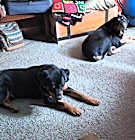
Henry and Raaz
Rottweiler
Male, adult
Westerville, OH
Not good with dogs
Not good with cats
Needs experienced adopter
House-trained
Spayed or Neutered
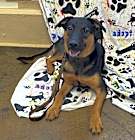
Rocco
German Shepherd Dog Labrador Retriever
Male, adult
New Albany, OH
Good with dogs
Good with cats
House-trained
Spayed or Neutered
Shots are up-to-date
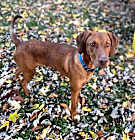
Hunter
Doberman Pinscher Hound (Unknown Type)
Male, 3 yrs 4 mos
Lewis Center, OH
Not good with dogs
Not good with cats
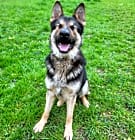
Loki
German Shepherd Dog
Male, 2 yrs 4 mos
Lewis Center, OH
Not good with dogs
Not good with cats
Spayed or Neutered
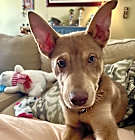
DINO
German Shepherd Dog Weimaraner
Male, 6 mos
Columbus, OH
Good with dogs
Not good with cats
House-trained
Spayed or Neutered
Shots are up-to-date
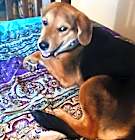
DIXIE
German Shepherd Dog Bernese Mountain Dog
Female, 9 mos
Columbus, OH
Good with dogs
Not good with cats
House-trained
Spayed or Neutered
Shots are up-to-date
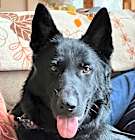
Zoey
German Shepherd Dog
Female, 3 yrs 2 mos
Columbus, OH
Not good with dogs
Not good with cats
House-trained
Spayed or Neutered
Shots are up-to-date
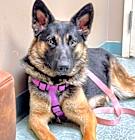
Juliet
German Shepherd Dog
Female, 1 yr 2 mos
Columbus, OH
Good with dogs
Not good with cats
House-trained
Spayed or Neutered
Shots are up-to-date

Henry and Raaz
Rottweiler
Male, adult
Westerville, OH
Not good with dogs
Not good with cats
Needs experienced adopter
House-trained
Spayed or Neutered

Rocco
German Shepherd Dog Labrador Retriever
Male, adult
New Albany, OH
Good with dogs
Good with cats
House-trained
Spayed or Neutered
Shots are up-to-date

Hunter
Doberman Pinscher Hound (Unknown Type)
Male, 3 yrs 4 mos
Lewis Center, OH
Not good with dogs
Not good with cats

Loki
German Shepherd Dog
Male, 2 yrs 4 mos
Lewis Center, OH
Not good with dogs
Not good with cats
Spayed or Neutered

DINO
German Shepherd Dog Weimaraner
Male, 6 mos
Columbus, OH
Good with dogs
Not good with cats
House-trained
Spayed or Neutered
Shots are up-to-date

DIXIE
German Shepherd Dog Bernese Mountain Dog
Female, 9 mos
Columbus, OH
Good with dogs
Not good with cats
House-trained
Spayed or Neutered
Shots are up-to-date




